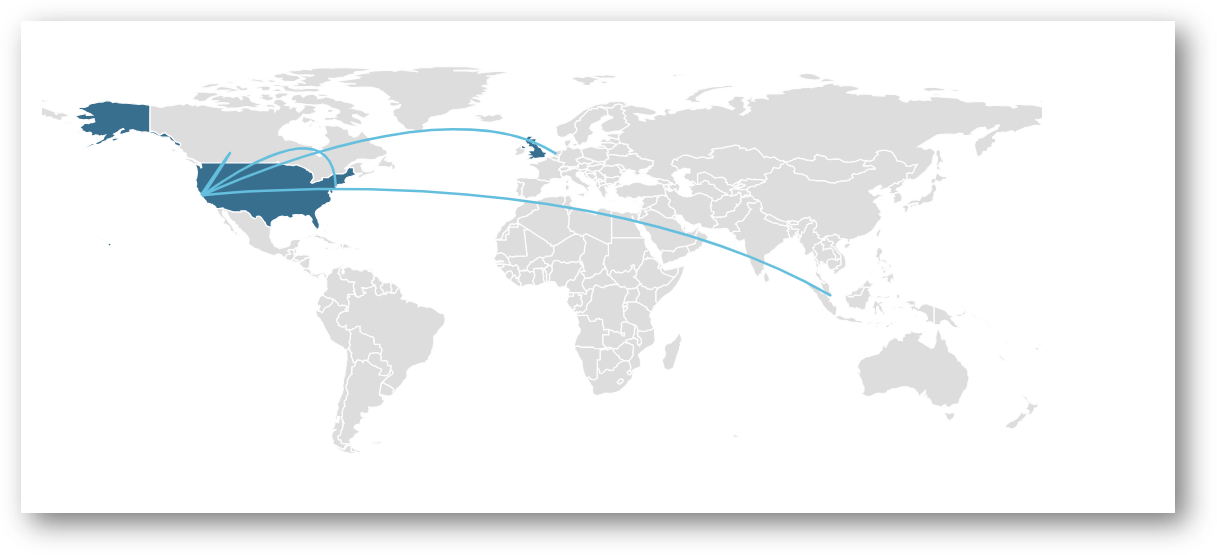File name: 6558073e997da5ca440b5a4b.exe
Size: 13 MB
Type: PE Windows Executable
Mime: application/x-dosexec
SHA256: 7f731d2502dd39cbc16193ca7e9d147fe158c10236e00c634bb0680e2bfc4bfa
Last VirusTotal Scan: 11/18/2023 00:20:37
Last Sandbox Report: 11/18/2023 00:22:13
Malware Family: IPStorm
Label: Trojan:Win32/Fsysna
0x01 IPStorm
This post is still a work in progress. I will update it as I make progress with this malware and will remove this comment when I am finished.
Earlier this week, several sites reported that the FBI dismantled the IPStorm botnet. The botnet was shut down on Tuesday, and Sergei Makinin has pleaded guilty to developing and deploying it.
What interested me about this article was learning that IPStorm was written in Go, allowing it to easily be compiled for different operating systems. Many sites have already written about the Linux variant of the malware, so I thought I'd take a look at a Windows sample.
The file details are listed above. All the Windows samples I could find were quite large for malware, over 13 MB. This will make analysis more difficult as the disassembled and decompiled code file will be full of spaghetti code.
0x02 Static Anaylsis
Go files, in general, are usually difficult to analyze as they are statically built and stripped. This results in very large files with hundreds or thousands of unlabeled functions. This sample was no different. Loading the sample in Ghidra revealed nothing but functions labeled as FUN_00XXXX, the default format Ghidra uses with unknown functions.
I installed the GolangAnalyzerExtension plugin to make analysis more manageable. This renamed all the random FUN_00XXXX functions to their proper names.
After loading the plugin, we can see the source path used by the malware author. The main file was saved at /Users/brokleg/go/src/storm/storm.go - here we can see why the malware was dubbed IPStorm, a combination of ipfs and storm.
Main Function
IPStorm implements its main logic in a package helpfully called main.
Upon execution, the main.main function starts its logging capability. It then begins calling functions from the storm package to bypass antivirus, set up file transfer, collect system runtime information, and add a new firewall rule using Powershell. The function also calls the single package to ensure that no other IPStorm processes are running.
Looking at function main.init, we can see a list of the packages called.
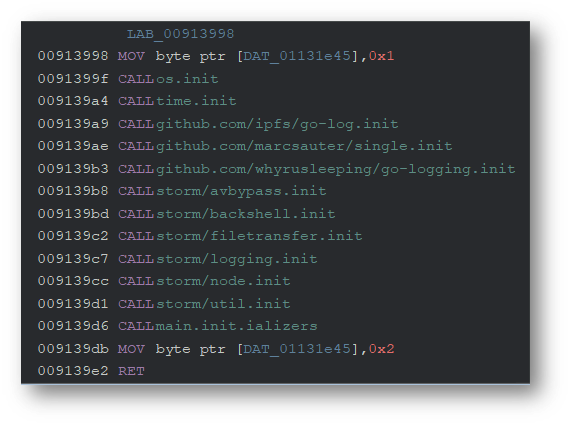
The main package of the malware is helpfully labeled as storm:
Antivirus Evasion
The Windows variant contains several functions to bypass any antivirus engines running on the host.
The malware makes several passes at evasion. In each pass, it calls the util.RandomInt and time.Sleep functions to pause for a random amount of time.
Installation and Persistence
The storm/util package is responsible for installing the malware and gaining a persistent foothold on the host OS. The malware uses several functions to achieve this goal.
The util package contains code to generate random folder and file names. It also references Microsoft.AAD.BrokerPlugin, which is part of Microsoft OneDrive.
The malware then uses Powershell to access the Windows registry. The code contains logic to access registry keys at HKCU:\Software\Microsoft\FixDrive\Registration and HKCU:\Software\Microsoft\Windows\CurrentVersion\Run. The CurrentVersion\Run key is used by programs to ensure that their executable starts every time the user logs in to Windows.
It later confirms it has been added to the registry keys by calling the storm.util.IsPersisted function.
Using Powershell, it creates a new firewall rule for itself to ensure it can communicate with its C2.
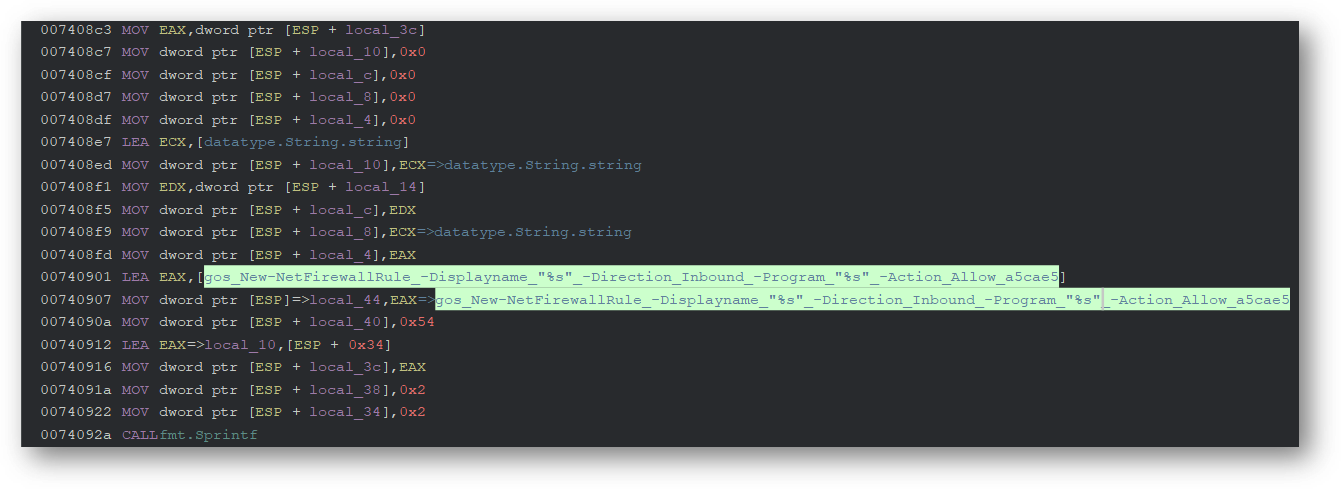
Powershell Feature
The Windows version of IPStorm uses Powershell to perform various tasks, including creating a reverse shell.
Reverse Shell
The backshell package uses Powershell to create a reverse shell on the system.
The reverse shell capability is the main threat posed by this malware, allowing the attacker to execute system commands on the infected system.
Other Interesting Functions
The malware checks if it is running in Wine, a compatibility layer that lets users run Windows programs on Linux.
0x03 Dynamic Analysis
Execution
To simplify the analysis, I renamed my malware sample ipstorm.exe. After running VMWare Cloak, I took a snapshot and detonated the malware. Immediately upon execution, the process creates a lock file at C:\<USER>\AppData\Local\Temp\n3R1PYfY.lock.
If the malware is started with elevated privileges, it drops the file at C:\Windows\Temp\n3R1PYfY.lock.
The process then launches cmd.exe, which launches powershell.exe -NoExit -Command -. Using Powershell, IPStorm creates a firewall rule and writes data to a file named StartupProfileData-Interactve.
The malware opens several TCP sockets and communicates with several hosts.
Network Calls
The sample attempts to connect to several different IPs and domains. Examining the strings in the process memory can give us more insight into what network activity is happening.
We can see some of the IPFS requests being made as well:
I've resolved a few of the domains to their IPs below:
104.131.131.82:4001 (mars.i.ipfs.io)Possible C2178.62.158.247:4001128.199.219.111:4001104.236.76.40:4001104.236.179.241:4001_dnsaddr.sv15.bootstrap.libp2p.io (139.178.91.71)
All hosts except 104.131.131.82 and 139.178.91.71 are down. We can see some preliminary evidence that an IPFS service is running on at least one of the hosts:
sudo nmap -sV 104.131.131.82 -p 8080,4001
Starting Nmap 7.94 ( https://nmap.org ) at 2023-11-18 08:49 PST
Nmap scan report for mars.i.ipfs.io (104.131.131.82)
Host is up (0.020s latency).
PORT STATE SERVICE VERSION
4001/tcp open libp2p-multistream libp2p multistream protocol 1.0.0
8080/tcp open http Golang net/http server (Go-IPFS json-rpc or InfluxDB API)
Trying to navigate to port 8080 in a browser gives a very non-descript 404:
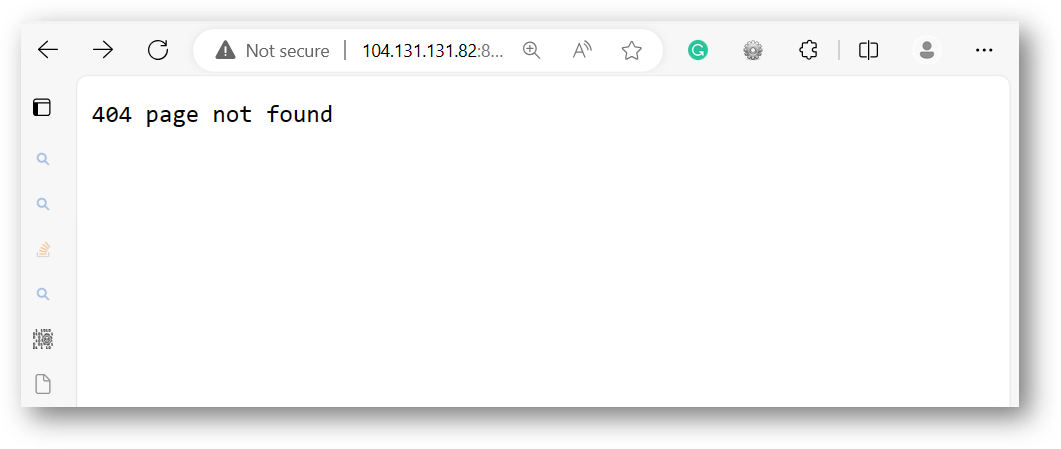
By playing with the URL path a bit, we can see a descriptive error message clearly showing IPFS:
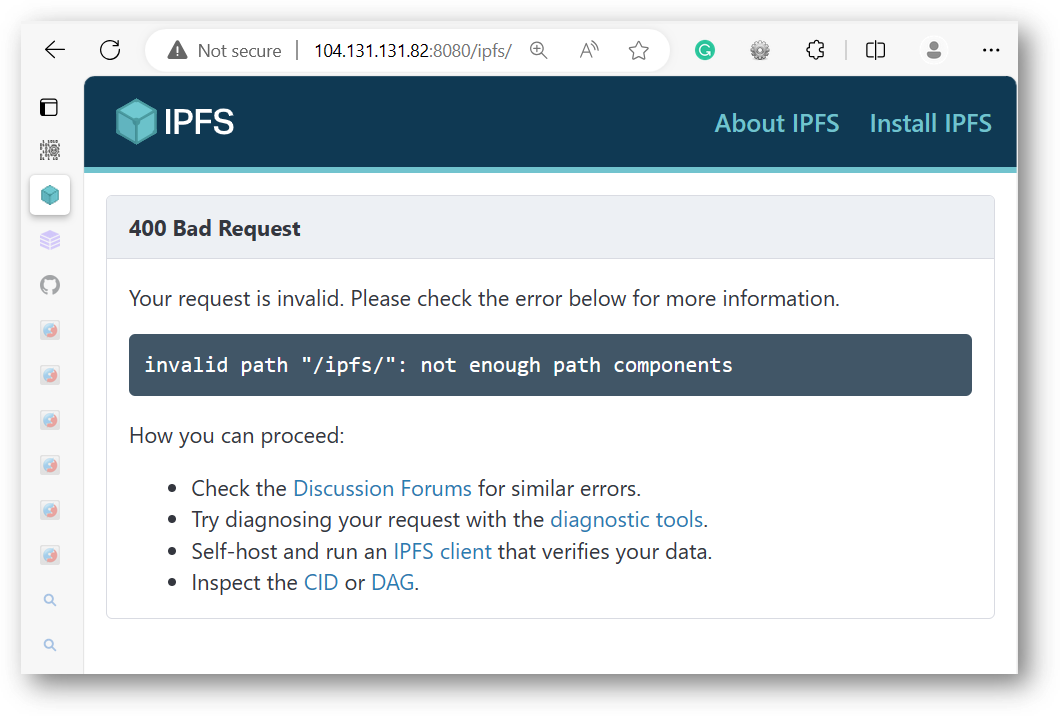
Thus far, every sample of IPStorm I've looked at contacts this host and the one below (sv15.bootstrap.libp2p.io).
This application needs an IPFS content identifier or CID. This can be a string or a file. IPFS encodes all content into a base58 encoded hash called a multihash. As an example, we can have the application display back a message by navigating to http://104.131.131.82:8080/ipfs/QmWATWQ7fVPP2EFGu71UkfnqhYXDYH566qy47CnJDgvs8u:
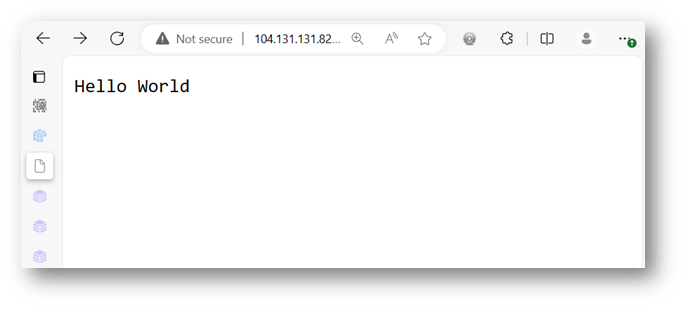
The last address - _dnsaddr.bootstrap.libp2p.io - is interesting as it appears to be using multiaddr. Here is an excerpt from their github
Without multiaddr support, the domain is unreachable as-is, possibly another built-in defense mechanism to evade analysis in a sandbox.
nslookup _dnsaddr.sv15.bootstrap.libp2p.io
Server: 172.31.80.1
Address: 172.31.80.1#53
Non-authoritative answer:
*** Can't find _dnsaddr.sv15.bootstrap.libp2p.io: No answer
Removing the _dnsaddr gives a little more info:
nslookup sv15.bootstrap.libp2p.io
Server: 172.31.80.1
Address: 172.31.80.1#53
Non-authoritative answer:
Name: sv15.bootstrap.libp2p.io
Address: 139.178.91.71
Name: sv15.bootstrap.libp2p.io
Address: 2604:1380:45e3:6e00::1
Running a whois 139.178.91.71 reveals that the IP is assigned to Equinix Services, a network provider and data center based in New York.
Nmap reveals a little more information about the application running on port 4001:
sudo nmap -sV 139.178.91.71 -p 443,4001
Starting Nmap 7.94 ( https://nmap.org ) at 2023-11-18 08:42 PST
Nmap scan report for sv15 (139.178.91.71)
Host is up (0.032s latency).
PORT STATE SERVICE VERSION
443/tcp open ssl/http nginx 1.16.1
4001/tcp open libp2p-multistream libp2p multistream protocol 1.0.0
Service detection performed. Please report any incorrect results at https://nmap.org/submit/ .
Nmap done: 1 IP address (1 host up) scanned in 19.68 seconds
nc -v 139.178.91.71 4001
Warning: forward host lookup failed for sv15: Unknown host
sv15 [139.178.91.71] 4001 (?) open
/multistream/1.0.0
The web server is a wrapper for the multistream service on port 4001:
curl https://sv15.bootstrap.libp2p.io/
WebSocket protocol violation: Connection header "keep-alive" does not contain Upgrade
Using websocat, we can connect to the server using a websocket:
./websocat_max.x86_64-unknown-linux-musl wss://sv15.bootstrap.libp2p.io//multistream/1.0.0
/multistream/1.0.0
Multistream Requests
I captured and extracted the following multisteam DNS requests:
| Request | Response |
|---|---|
| _dnsaddr.bootstrap.libp2p.io | dnsaddr=/dnsaddr/sv15.bootstrap.libp2p.io/p2p/QmNnooDu7bfjPFoTZYxMNLWUQJyrVwtbZg5gBMjTezGAJN |
| _dnsaddr.bootstrap.libp2p.io | dnsaddr=/dnsaddr/sg1.bootstrap.libp2p.io/p2p/QmcZf59bWwK5XFi76CZX8cbJ4BhTzzA3gU1ZjYZcYW3dwt |
| _dnsaddr.bootstrap.libp2p.io | dnsaddr=/dnsaddr/am6.bootstrap.libp2p.io/p2p/QmbLHAnMoJPWSCR5Zhtx6BHJX9KiKNN6tpvbUcqanj75Nb |
| _dnsaddr.bootstrap.libp2p.io | dnsaddr=/dnsaddr/ny5.bootstrap.libp2p.io/p2p/QmQCU2EcMqAqQPR2i9bChDtGNJchTbq5TbXJJ16u19uLTa |
| _dnsaddr.sv15.bootstrap.libp2p.io | dnsaddr=/dns4/sv15.bootstrap.libp2p.io/tcp/443/wss/p2p/QmNnooDu7bfjPFoTZYxMNLWUQJyrVwtbZg5gBMjTezGAJN |
| _dnsaddr.sv15.bootstrap.libp2p.io | dnsaddr=/ip4/139.178.91.71/udp/4001/quic-v1/p2p/QmNnooDu7bfjPFoTZYxMNLWUQJyrVwtbZg5gBMjTezGAJN |
| _dnsaddr.sv15.bootstrap.libp2p.io | dnsaddr=/dns6/sv15.bootstrap.libp2p.io/tcp/443/wss/p2p/QmNnooDu7bfjPFoTZYxMNLWUQJyrVwtbZg5gBMjTezGAJN |
| _dnsaddr.sv15.bootstrap.libp2p.io | dnsaddr=/ip4/139.178.91.71/tcp/4001/p2p/QmNnooDu7bfjPFoTZYxMNLWUQJyrVwtbZg5gBMjTezGAJN |
| _dnsaddr.sv15.bootstrap.libp2p.io | dnsaddr=/ip6/2604:1380:45e3:6e00::1/udp/4001/quic-v1/p2p/QmNnooDu7bfjPFoTZYxMNLWUQJyrVwtbZg5gBMjTezGAJN |
| _dnsaddr.sv15.bootstrap.libp2p.io | dnsaddr=/ip6/2604:1380:45e3:6e00::1/udp/4001/quic/p2p/QmNnooDu7bfjPFoTZYxMNLWUQJyrVwtbZg5gBMjTezGAJN |
| _dnsaddr.sv15.bootstrap.libp2p.io | dnsaddr=/ip4/139.178.91.71/udp/4001/quic/p2p/QmNnooDu7bfjPFoTZYxMNLWUQJyrVwtbZg5gBMjTezGAJN |
| _dnsaddr.sv15.bootstrap.libp2p.io | dnsaddr=/ip6/2604:1380:45e3:6e00::1/tcp/4001/p2p/QmNnooDu7bfjPFoTZYxMNLWUQJyrVwtbZg5gBMjTezGAJN |
| _dnsaddr.ny5.bootstrap.libp2p.io | dnsaddr=/dns6/ny5.bootstrap.libp2p.io/tcp/443/wss/p2p/QmQCU2EcMqAqQPR2i9bChDtGNJchTbq5TbXJJ16u19uLTa |
| _dnsaddr.ny5.bootstrap.libp2p.io | dnsaddr=/ip4/136.144.51.25/udp/4001/quic-v1/p2p/QmQCU2EcMqAqQPR2i9bChDtGNJchTbq5TbXJJ16u19uLTa |
| _dnsaddr.ny5.bootstrap.libp2p.io | dnsaddr=/ip4/136.144.51.25/tcp/4001/p2p/QmQCU2EcMqAqQPR2i9bChDtGNJchTbq5TbXJJ16u19uLTa |
| _dnsaddr.ny5.bootstrap.libp2p.io | dnsaddr=/dns4/ny5.bootstrap.libp2p.io/tcp/443/wss/p2p/QmQCU2EcMqAqQPR2i9bChDtGNJchTbq5TbXJJ16u19uLTa |
| _dnsaddr.ny5.bootstrap.libp2p.io | dnsaddr=/ip6/2604:1380:45d2:8100::1/udp/4001/quic-v1/p2p/QmQCU2EcMqAqQPR2i9bChDtGNJchTbq5TbXJJ16u19uLTa |
| _dnsaddr.ny5.bootstrap.libp2p.io | dnsaddr=/ip6/2604:1380:45d2:8100::1/tcp/4001/p2p/QmQCU2EcMqAqQPR2i9bChDtGNJchTbq5TbXJJ16u19uLTa |
| _dnsaddr.ny5.bootstrap.libp2p.io | dnsaddr=/ip4/139.178.65.157/udp/4001/quic/p2p/QmQCU2EcMqAqQPR2i9bChDtGNJchTbq5TbXJJ16u19uLTa |
| _dnsaddr.ny5.bootstrap.libp2p.io | dnsaddr=/ip6/2604:1380:45d2:8100::1/udp/4001/quic/p2p/QmQCU2EcMqAqQPR2i9bChDtGNJchTbq5TbXJJ16u19uLTa |
| _dnsaddr.sg1.bootstrap.libp2p.io | dnsaddr=/dns6/sg1.bootstrap.libp2p.io/tcp/443/wss/p2p/QmcZf59bWwK5XFi76CZX8cbJ4BhTzzA3gU1ZjYZcYW3dwt |
| _dnsaddr.sg1.bootstrap.libp2p.io | dnsaddr=/ip4/145.40.118.135/udp/4001/quic-v1/p2p/QmcZf59bWwK5XFi76CZX8cbJ4BhTzzA3gU1ZjYZcYW3dwt |
| _dnsaddr.sg1.bootstrap.libp2p.io | dnsaddr=/dns4/sg1.bootstrap.libp2p.io/tcp/443/wss/p2p/QmcZf59bWwK5XFi76CZX8cbJ4BhTzzA3gU1ZjYZcYW3dwt |
| _dnsaddr.sg1.bootstrap.libp2p.io | dnsaddr=/ip4/145.40.118.135/tcp/4001/p2p/QmcZf59bWwK5XFi76CZX8cbJ4BhTzzA3gU1ZjYZcYW3dwt |
| _dnsaddr.sg1.bootstrap.libp2p.io | dnsaddr=/ip6/2604:1380:40e1:9c00::1/udp/4001/quic/p2p/QmcZf59bWwK5XFi76CZX8cbJ4BhTzzA3gU1ZjYZcYW3dwt |
| _dnsaddr.sg1.bootstrap.libp2p.io | dnsaddr=/ip6/2604:1380:40e1:9c00::1/tcp/4001/p2p/QmcZf59bWwK5XFi76CZX8cbJ4BhTzzA3gU1ZjYZcYW3dwt |
| _dnsaddr.sg1.bootstrap.libp2p.io | dnsaddr=/ip6/2604:1380:40e1:9c00::1/udp/4001/quic-v1/p2p/QmcZf59bWwK5XFi76CZX8cbJ4BhTzzA3gU1ZjYZcYW3dwt |
| _dnsaddr.sg1.bootstrap.libp2p.io | dnsaddr=/ip4/145.40.118.135/udp/4001/quic/p2p/QmcZf59bWwK5XFi76CZX8cbJ4BhTzzA3gU1ZjYZcYW3dwt |
| _dnsaddr.am6.bootstrap.libp2p.io | dnsaddr=/ip4/147.75.87.27/tcp/4001/p2p/QmbLHAnMoJPWSCR5Zhtx6BHJX9KiKNN6tpvbUcqanj75Nb |
| _dnsaddr.am6.bootstrap.libp2p.io | dnsaddr=/dns4/am6.bootstrap.libp2p.io/tcp/443/wss/p2p/QmbLHAnMoJPWSCR5Zhtx6BHJX9KiKNN6tpvbUcqanj75Nb |
| _dnsaddr.am6.bootstrap.libp2p.io | dnsaddr=/dns6/am6.bootstrap.libp2p.io/tcp/443/wss/p2p/QmbLHAnMoJPWSCR5Zhtx6BHJX9KiKNN6tpvbUcqanj75Nb |
| _dnsaddr.am6.bootstrap.libp2p.io | dnsaddr=/ip4/147.75.87.27/udp/4001/quic-v1/p2p/QmbLHAnMoJPWSCR5Zhtx6BHJX9KiKNN6tpvbUcqanj75Nb |
| _dnsaddr.am6.bootstrap.libp2p.io | dnsaddr=/ip6/2604:1380:4602:5c00::3/udp/4001/quic/p2p/QmbLHAnMoJPWSCR5Zhtx6BHJX9KiKNN6tpvbUcqanj75Nb |
| _dnsaddr.am6.bootstrap.libp2p.io | dnsaddr=/ip6/2604:1380:4602:5c00::3/udp/4001/quic-v1/p2p/QmbLHAnMoJPWSCR5Zhtx6BHJX9KiKNN6tpvbUcqanj75Nb |
| _dnsaddr.am6.bootstrap.libp2p.io | dnsaddr=/ip6/2604:1380:4602:5c00::3/tcp/4001/p2p/QmbLHAnMoJPWSCR5Zhtx6BHJX9KiKNN6tpvbUcqanj75Nb |
| _dnsaddr.am6.bootstrap.libp2p.io | dnsaddr=/ip4/147.75.87.27/udp/4001/quic/p2p/QmbLHAnMoJPWSCR5Zhtx6BHJX9KiKNN6tpvbUcqanj75Nb |
Contacted Countries
